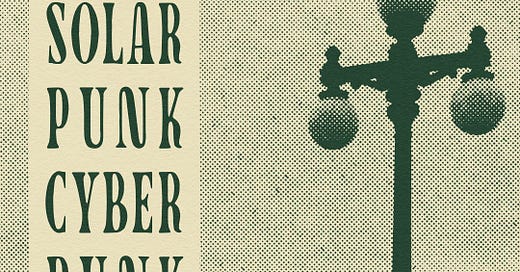It's been a bit since I last did a link roundup, so I wanted to share some media I've been enjoying lately. This time, the unintentional theme is both cyberpunk and solarpunk. And things are weighted heavily in the direction of electronic song remixes and books about tech, but that's just how it is sometimes. Anyway, read to the end for links to two audiobooks that you can access in podcast form.
Videos
The World is Not Ending by Sophie from Mars
This is probably the best video essay I've seen, and this is coming from someone who watches . . . a lot . . . of video essays. In this two-hour video, the Sophie from Mars outlines a convincing argument for having hope in a world that often feels like it's ending. If you're into [[solarpunk]] things at all, or if you just want to hear a narrative that isn't entirely doom-and-gloom (but which also stays realistic and clear-eyed), check this out. In the month or so since it's been out, I've already watched it multiple times.
Music
"Newborn (Ada Remix)" by Aaron Ahrends
I was listening to a YouTube mix curated by one of my favorite musicians (Christian Löffler), and when this song came on I completely fell in love with it. It's really . . . devastating? But in a good way? I've had it on repeat a lot lately.
"Milkshake" remix by Alex Wann
Who would've thought that in the year of our lord 2023 I'd be listening to a remix of "Milkshake" by Kelis? But, listen, this remix is really great.
"Vois sur ton chemin" remix by BENNETT
Do you remember that French movie Les Choristes that came out in 2004 and was nominated for some Academy Awards? Well, I do, because we watched it in French class and movie days at school were the best. Anyway, the song that got the movie nominated for an Oscar has gotten a techno remix and it's a delight.
Books
The Hacker Crackdown by Bruce Sterling
In an exercise in tech-based nostalgia, I've been listening to the free, Cory Doctorow-narrated audiobook of the classic 1992 book The Hacker Crackdown: Law and Disorder on the Electronic Frontier by Bruce Sterling. It's been an interesting listen 1) because it's a good book and 2) because of the layers of . . . nostalgia? Dated-ness? It's got that early 90s cyberspace vibe, when the transition between phone hacking and internet-based computer hacking was happening.
It's a nonfiction book about the internet written by a cyberpunk novelist in the early 1990s, so there's a particular charm there. (Who doesn't love that 1990s cyberpunk vibe?) But on top of that, the audiobook was recorded about 15 years ago and released as episodes of Cory Doctorow's podcast. There're little segments at the beginning of each installment where Cory Doctorow gives podcast-y updates and such, which of course feature mentions of then-current tech like iPods, etc.
So that's another layer of narrative that features little reminders of a bygone time. I've been really stuck on this idea of commonplace nostalgia, small fragments of digital ephemera that reminds us of how we used to move through the world and interact with tech, so this certainly falls into that.
Oh, and one cool piece of trivia is that Bruce Sterling released the book in free, electronic form in 1994, a couple years after the print book was published and many years before ebooks were a commonplace thing. (You can still read it for free here.) A pretty cool bit of internet history.
If you want to listen to the podcast/audiobook, you can check it out on Boing Boing or you can just put this feed into your podcatcher.
How to Destroy Surveillance Capitalism by Cory Doctorow
I'm on a real Cory-Doctorow-narrated-book kick right now. (And yes, I also already listened to the audiobook of his new book The Internet Con, which came out last week.)
Anyway, you can listen to How to Destroy Surveillance Capitalism for free on his podcast. I believe it's an answer to The Age of Surveillance Capitalism by Shoshana Zuboff, a book that I found so bleak and depressing that I couldn't finish it. (I did listen to some interesting interviews with the author, though.)
How to Destroy Surveillance Capitalism is a much more hopeful view of, you know . . . the state of things. Doctorow doesn't assume that tech companies are all-powerful entities that can brainwash people, and he argues that there's a path to improving things. Which is what I like to see.





